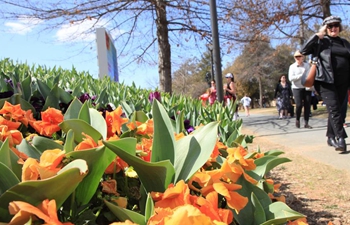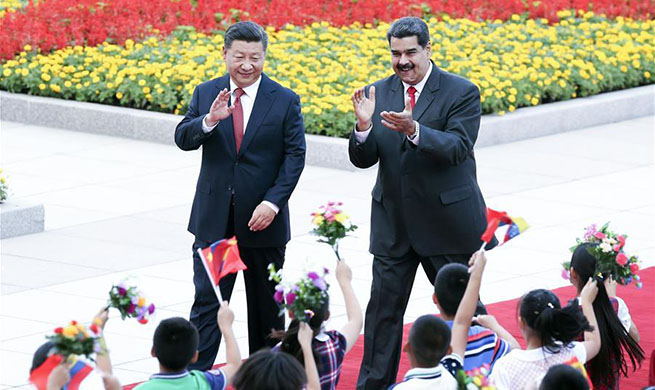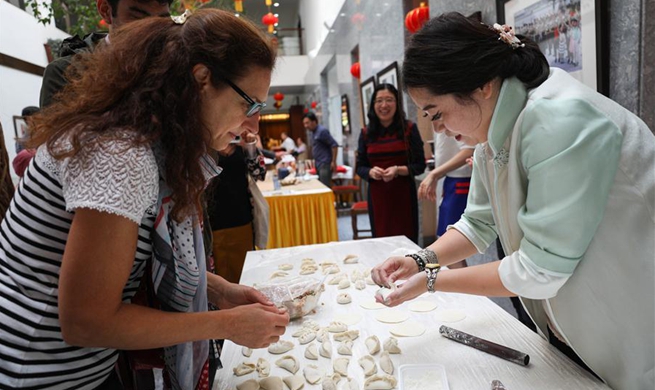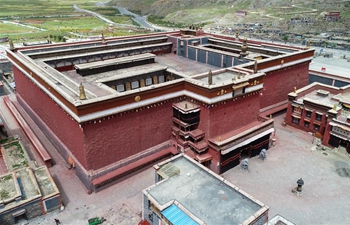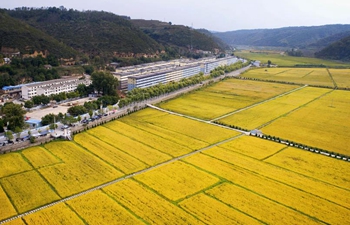by Xinhua writers Ye Zaiqi and Wang Wen
SAN FRANCISCO, Sept. 15 (Xinhua) -- A young American lady took a deep breath of fresh air during a break from presence at a full morning of tense panel discussions at an international summit on climate change which may define human future.
Emily Hite, a graduate student of University of Colorado Boulder who showed up at the 2018 Global Climate Action Summit (GCAS) with curiosity, found something intriguing that may become part of her doctoral research program on climate change policy.
"I'm volunteering to attend the event trying to understand what everybody is talking about, how our decisions are made, who is making decision, who has the power to decide climate policy," she said.
The three-day GCAS attracted more than 4,500 representatives from leaders of governments and businesses, regions, cities, investors and civil organizations on topics of climate change that impacts hugely on the future of both the globe and human existence.
"I'm a graduate student and so I think it's really important as well to have students and young folks involved," she said.
All speakers, from government officials, entrepreneurs, environmentalists to American Hawaii indigenous people, took turns onto the stage to deliver the same message to the world: step up action to address climate challenge and save Mother Earth.
The GCAS gathering, which took place from Thursday to Friday, came as Hurricane Florence swept into North Carolina with heavy rains and 144-kph winds earlier Friday.
Tropical Storm Florence killed at least five people in North Carolina on Friday after it came ashore as a Category 1 hurricane.
Scientists have said climate change will likely increase the intensity and frequency of such extreme weather and bring about more natural disasters.
Climate change has produced direct negative impact on human life, but not everyone is fully aware of it.
In some areas, the impact of climate change is more noticeable than others and therefore it's a problem trying to convince some people to act now, she said.
"I work with some of the communities in Costa Rica where it's very evident and so they are very eager to find solutions," Hite noted.
However, "some folks in the U.S. are not as eager because they don't feel it directly unless they're right next to drought or fire or floods or hurricanes or things like that," the young American scholar expressed her concern.
She shrugged off U.S. President Donald Trump's contentious policy on climate change and global warming, as the U.S. administration decided last year to pull out of the landmark Paris Agreement that committed all states across the globe to take joint actions on climate challenge.
Like most people saying here, Trump's decision to exit from the Paris accord "is challenging, it's problematic for the federal government to have that stance," Hite said.
"But everyone here is saying (the opposite), like the mayors, the governors and the City Council. People are stepping up at local levels and so I think that's really important and luckily they're all taking steps to do about it to fill the gaps," she said.
Right now, most of the actions were taken by local governments, she said, adding that in order to make the Paris Agreement more sustainable, "it would be more effective perhaps with the support of the federal government, and so hopefully that will change in the future."
"But really a lot of actions are happening at the local level, and so I think it's really important at all levels and at the very least mayors and governors are doing their job. I think that will help inform the federal government as well," Hite explained.
She said the San Francisco summit, which was declared closed late Friday with California Governor Jerry Brown promising to launch the state's own satellite to track major emissions sources, has unveiled many achievements and action plans. "There are so many and these are the wonderful announcements of the goals that everyone is trying to reach in the next few years."
In 2015, 196 countries around the globe came together under the Paris Agreement to transform their development trajectories so that they set the world on a course toward sustainable development, aiming at limiting warming to 1.5 to 2 degrees Celsius above pre-industrial levels.
California, the host of the 2018 GCAS, came up with an even more ambitious plan as Brown pushes for aggressive measures to reduce its net output of greenhouse gases into the atmosphere to zero by 2045 and make the Golden State a carbon-neutral pioneer.
Hite said the summit will help the Paris goal come true, noting that "achieving carbon neutrality the earlier the better," because that process will encourage the public to embrace "clean and renewable energy that is actually taking into consideration social and environmental costs."
The summit is "a really great conference in general," said Hite, who is a member of a volunteer group in California. "There's a lot of diverse groups here from all over the country as well as the world, at various levels of government and the civil sector."




